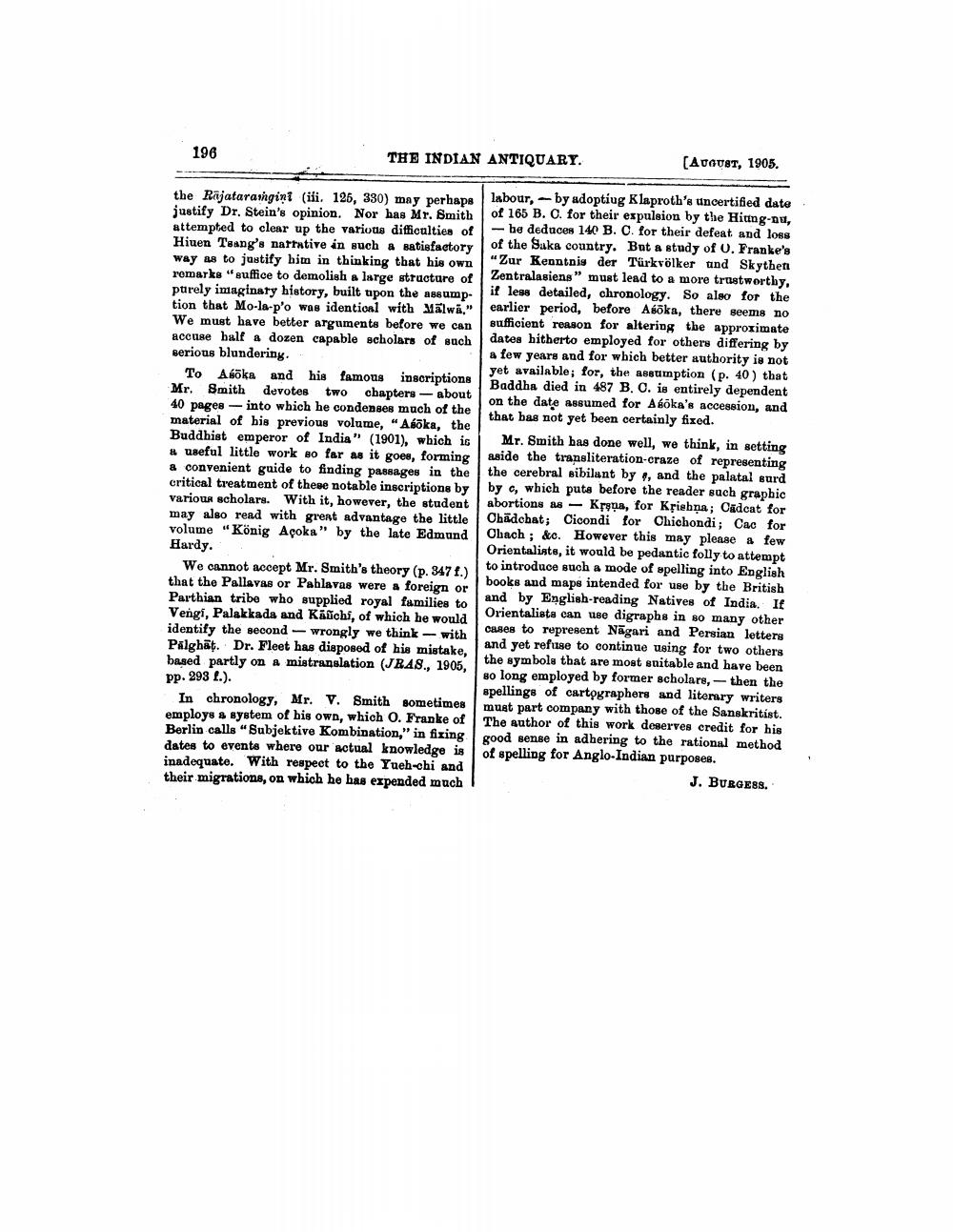________________
196
THE INDIAN ANTIQUARY.
(AUGUST, 1905.
the Rajatarashgint (ifi. 126, 330) may perhaps labour, -by adoptiug Klaproth's uncertified date. iustify Dr. Stein's opinion. Nor has Mr. Smith 1 of 165 B. O. for their expulsion by the Hiting-nu, attempted to clear up the various difficulties of
various difficulties of - be deduces 140 B. C. for their defeat and loss Hiuen Tsang's narrative in such a satisfactory
of the Saka country. But a study of 0. Franke's way as to justify him in thinking that his own
"Zur Kenntnis der Türkvölker und Skytheti remarks "suffice to demolish a large structure of
Zentralasiens" must lead to a more trustworthy, ptirely imaginary history, built upon the assump
if less detailed, chronology. So also for the tion that Mo-la-p'o was identionl with Malwa." earlier period, before Aboka, there seems no We must have better arguments before we can sufficient reason for altering the approximate accuse ball a dozen capable scholars of such dates hitherto employed for others differing by serious blunderiny.
a few years and for which better authority is not
yet available; for, the assumption (p. 40 ) that To Asöka and his famous inscriptions
Baddha died in 487 B. O. is entirely dependent Mr. Smith devotes two chapters - about
on the date assumed for Aboka's accession, and 40 pages into which he condenses much of the material of his previous volume, “Aboka, the
that has not yet been certainly fixed. Buddhist emperor of India" (1901), which is Mr. Smith bas done well, we think, in setting # useful little work so far as it goes, forming aside the transliteration-craze of representing a convenient guide to finding passages in the the cerebral sibilant by #, and the palatal surd critical treatment of these notable inscriptions by byc, which puts before the reader such graphic various scholars. With it, however, the student abortions as - Krena, for Kriebna; Cadeat for may also read with great advantage the little Obädcbat; Cicondi for Chichondi; Cac for volume "König Acoka" by the late Edmund Obach ; &c. However this may please & few Hardy.
Orientalists, it would be pedantic folly to attempt We cannot accept Mr. Smith's theory (p. 347 f.)
to introduce such a mode of spelling into English that the Pallavas or Pahlavas were a foreign or
books and maps intended for use by the British Parthian tribe who supplied royal families to
and by English-reading Natives of India. It Vengi, Palakkada and Katchi, of which he would
Orientalista can use digraphe in so many other identify the second wrongly we think - with
cases to represent Nagari and Persian letters Palghāt. Dr. Fleet has disposed of his mistake,
and yet refuse to continue using for two others based partly on a mistranslation (JRAS., 1905,
the symbols that are most suitable and have been
80 long employed by former scholars, then the pp. 293 f.).
spellings of cartographers and literary writers In chronology, Mr. V. Smith sometimes
must part company with those of the Sanskritist. employs a system of his own, which 0. Franke of
The author of this work deserves credit for his Berlin calls "Subjektive Kombination," in fizing good sense in adhering to the rational method dates to events where our actual knowledge is of spelling for Anglo-Indian purposes. inadequate. With respect to the Yueh-chi and their migrations, on which he has expended much
J. BURGE89.




